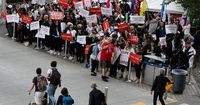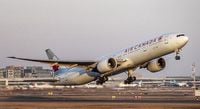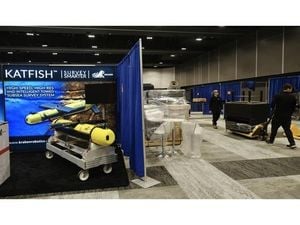Air Canada’s skies remain turbulent as the airline’s 10,000-plus flight attendants continue their strike, defying a government-backed order to return to work and throwing the travel plans of more than 100,000 passengers into chaos. The labor action, which began in the early hours of August 16, 2025, has led to the cancellation of nearly 700 daily flights and left the nation’s largest airline scrambling for solutions during the peak of the summer travel season.
The standoff reached a new intensity on August 17, when Air Canada announced it was suspending plans to resume limited operations after the union representing its flight attendants, the Canadian Union of Public Employees (CUPE), declared it would not comply with the Canada Industrial Relations Board’s (CIRB) back-to-work order. The airline had hoped to get some flights off the ground that afternoon, but ultimately canceled approximately 240 scheduled departures, citing the ongoing strike. Air Canada now says it will attempt to resume flights on the evening of August 18, though with the union’s defiance, it’s unclear how those plans will unfold.
Passengers have been caught in the crossfire, with many arriving at airports to find their flights suddenly canceled. According to CBC News, Air Canada and Air Canada Rouge operations are both affected, while flights operated by third-party airlines Jazz and PAL continue. The airline has advised customers with canceled flights to avoid airports unless they have confirmed bookings with other carriers, and is offering refunds, credits, or rebooking options—though capacity on other airlines is limited, especially during the busy summer months.
The roots of the dispute trace back months, as negotiations over a new contract between Air Canada and its flight attendants dragged on with little progress. The previous collective agreement expired on March 31, 2025, and the union’s key grievances center on wages that have failed to keep pace with inflation and the issue of unpaid labor. Flight attendants are paid only when the aircraft is moving—from pushback to arrival—meaning hours spent on the ground during boarding, deplaning, or delays go uncompensated. As Wesley Lesosky, president of the Air Canada component of CUPE, put it at a Toronto press conference, “We are here because Air Canada forces us to work for free for hours and hours every day, and we are here because we are not going to accept it anymore.”
CUPE, representing more than 10,000 flight attendants, has been vocal about its opposition to binding arbitration, preferring to resolve the dispute through direct bargaining. The union’s statement, reported by FOX Business, was unequivocal: “We will be challenging this blatantly unconstitutional order that violates the Charter rights of 10,517 flight attendants, 70% of whom are women, and 100% of whom are forced to do hours of unpaid work by their employer every time they come to work.” The union has also accused the federal government of caving to Air Canada’s demands, arguing that government intervention “sets a terrible precedent” for labor relations in the country.
The federal government, led by Jobs Minister Patty Hajdu and Prime Minister Mark Carney, stepped in on August 16, invoking Section 107 of the Labour Code to ask the CIRB to order both parties to binding arbitration and mandate a return to work. The government’s action was taken “in the interest of protecting the economy,” as allowed under Canadian labor law. However, the move has sparked controversy, with CUPE and labor experts questioning the constitutionality of the order and the precedent it sets for future disputes.
“I don’t think anyone’s in the mood to go back to work,” Lillian Speedie, vice-president of CUPE Local 4092, told CBC News from a picket line at Toronto Pearson International Airport. She added, “To legislate us back to work 12 hours after we started? I’m sorry, snowstorms have shut down Air Canada for longer than we were allowed to strike.” The union has launched a national day of action, with demonstrations outside airports in Toronto, Montreal, Vancouver, and Calgary, and has invited Air Canada back to the bargaining table to “negotiate a fair deal.”
Other unions have joined the picket lines in solidarity, with Natasha Stea, a local union president and Air Canada flight attendant, telling Reuters, “They are in support here today because they are seeing our rights being eroded.” The rare defiance of a CIRB order has left the federal government and Air Canada in a difficult position, as it is not immediately clear what enforcement options remain if the strike continues. The government could seek a court order or request an expedited hearing, but for now, the impasse continues.
Air Canada, for its part, has argued that its compensation package would make its flight attendants the best paid in the country. The airline claims the offer would raise overall compensation by 38% over four years, with hourly rates climbing as high as 94 Canadian dollars (about $69 U.S.) in the first year, reflecting a 12% to 16% increase that includes an 8% boost to base wages and another 4% to 8% through a new ground pay formula. By 2027, Air Canada says, senior flight attendants would earn an average of 87,000 Canadian dollars ($63,000 U.S.) annually, with about 20% making 90,000 Canadian dollars ($65,700 U.S.) or more. However, the union contends that the company is only offering 50% pay for ground duties like boarding and deplaning—not full hourly wages—and that the proposed wage hikes still fail to keep up with inflation or match the federal minimum wage.
Steven Tufts, a labor geographer at York University, told CBC News that Air Canada’s reliance on federal intervention has become a pattern, noting the airline’s request for government assistance during last year’s dispute with its pilots. “Air Canada has to learn not to call mommy and daddy every time they reach an impasse at the bargaining table. They have to actually sit down and get a deal done with their workers,” Tufts remarked. The CIRB has extended the terms of the expired collective agreement until a new deal is reached, but with both sides dug in, the path forward remains uncertain.
As the strike stretches into its third day, the disruption shows little sign of easing. Air Canada customers are left with few options, and the broader travel industry is feeling the ripple effects. With both the airline and its flight attendants standing firm, travelers and observers alike are watching closely to see which side will blink first—or whether a compromise can finally be reached at the negotiating table.






